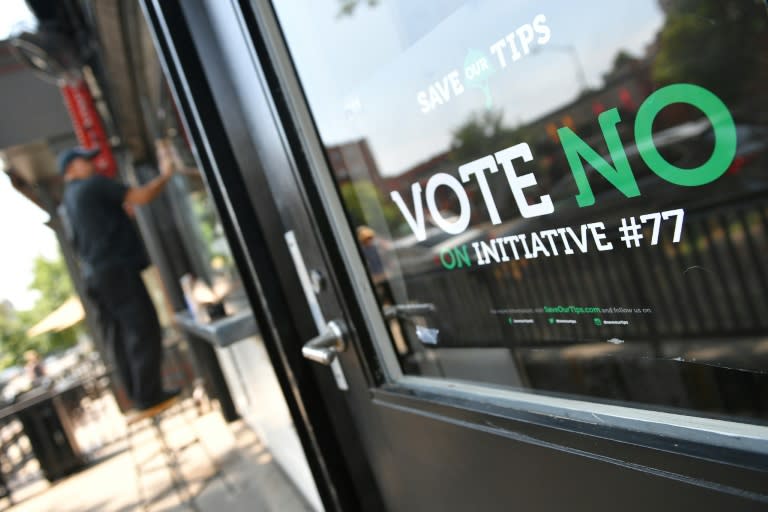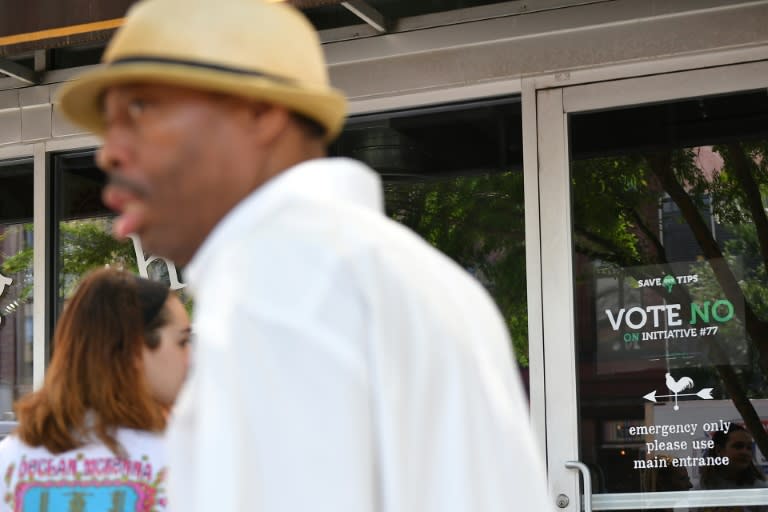Tipping on the table in Washington vote
Finish your meal, calculate the tip -- 10 to 20 percent, more if you're feeling generous -- and pay the bill. The culture of tipping is deeply ingrained in the United States. But the practice is being put to the test in the nation's capital with a vote on Tuesday that would impact tipping by instituting a higher minimum wage for restaurant workers. The Minimum Wage Amendment Act, or "Initiative 77" as the ballot measure is known, has divided restaurant employees and owners and sparked a heated debate in Washington. "Save Our Tips," read posters put up by opponents of the measure in windows and bathrooms of bars and restaurants around town. Supporters of a mandated minimum wage have countered by standing on street corners with "One Fair Wage" flyers of their own. Employers of tipped workers are currently exempt from paying the standard minimum wage, and some waiters and waitresses are paid as little as $3.33 an hour. But many tipped workers are against the legislation because they currently earn most of their money through tips, and they argue that a decrease in tipping could severely affect their income. Employers are currently legally required to make up the difference between an employee's earnings and the full minimum wage, which is currently $12.50, if their tips fall short. But Christopher Maggiano, a Washington small business owner who supports "Initiative 77," said "this is difficult to enforce" with a high rate of noncompliance. The proposed legislation would do away with the low minimum wage and require restaurants to pay their servers a full minimum wage of no less than $15 an hour by the year 2025. Opponents of the measure argue that it would cause menu prices to rise and tips to decline, hurting both restaurant owners and the servers the move is designed to protect. "One Fair Wage" claims it would help combat wage theft, tip discrimination against "back-end" workers such as dishwashers, many of whom are immigrants, and harassment linked to tipping. "Depending upon tips (means) putting up with unwelcome advances and comments to avoid losing a tip from a table with a large bill," said Maggiano, who serves on the board of Restaurant Opportunities Centers United, which backs "Initiative 77." - Pass on cost to customer - Restaurant investor Malachi Broadnax opposes the measure saying it will lead to higher prices and fewer customers. "We're going to have to pass on (that cost) to the customer," Broadnax said, through higher prices or a service charge. Natalia Ribera, a 24-year-old bartender at a trendy bar and cafe on 14th Street, said discouraging tips was likely to lead to a decline in service. "I think the service in the US is really good partially because people are relying on tips almost 100 percent," said Ribera. "Whereas overseas, service typically is not as great." Broadnax agreed, comparing servers to car salesmen working on commission. "We are selling two products -- I mean there's a reason people say bartenders are cheap psychologists," he told AFP, gesturing to his bartender watching the World Cup with patrons. "I don't think (customers are) coming in just for the food." Woong Chang is a 36-year-old bartender who grew up in California, one of seven states which have approved proposals similar to "One Fair Wage" already. "It's highly fluctuating," Chang said of relying on tips. "There will be weeks where you won't make what you expected to make. "Anything can happen, and suddenly you're looking at the last shift before you pay your rent, or pay your bills -- and you won't be able to," he said.



